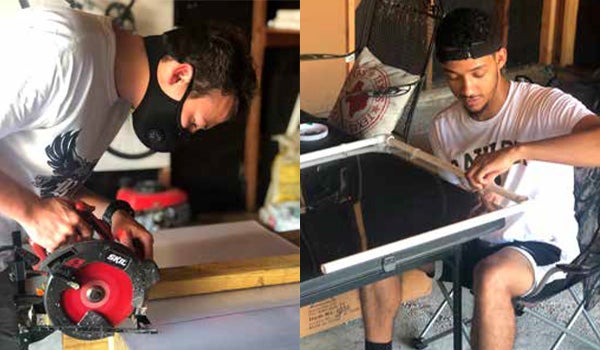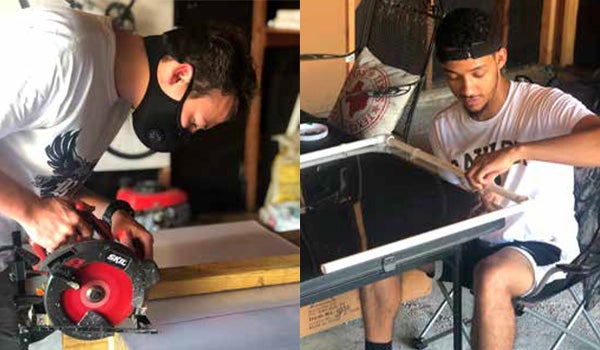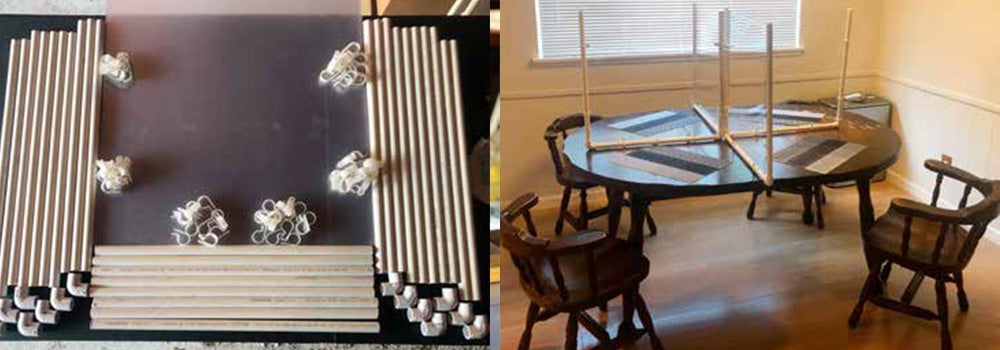When schoolteacher Sandra Whalen from Passmore Elementary School in Alvin, Texas, reached out to Rice University’s Department of Mechanical Engineering (MECH) for help in getting students back to school safely during the COVID-19 pandemic, Rice students didn’t hesitate to volunteer.
Passmore Elementary was required to provide in-person instruction and needed transparent partitions to separate desks and limit the spread of aerosolized droplets. They needed an inexpensive alternative to molded acrylic shields, which often cost more than $60 per divider.
of the partitions.
Coordinated by first-year Ph.D. student Barclay Jumet, a team of undergraduate and graduate MECH students designed low-cost custom partitions based on desk sizes. After drafting the concept, the students — freshman Doris Xu, junior Kasia Kiela and Ph.D. student Barathwaj “Barath” Murali — along with Jumet, finalized the design by implementing changes to improve stability. They documented the final version in a detailed assembly instruction guide.
“We all were eager to help and contribute, no matter how that might have been — from near or far, in technical or organizational aspects, in design to implementation,” Jumet said. “The project itself was a rewarding combination of engineering and philanthropy, a combination I am sure many others at Rice cherish and know intimately.”
Once the design was completed, Jumet reached out to representatives from the industrial parts and material supply company, McMaster-Carr, and they graciously committed to donate the required raw materials.
At the time, all on-campus operations for Rice students were still restricted, so Jumet received the materials at his apartment. With the help of his housemate and Rice Ph.D. student Marquise Bell, Jumet took two weeks and a few trips to the hardware store for tools to complete 48 partitions.
“Being able to assist the school was fulfilling because I had been wondering what else I could do to help others get through the pandemic safely,” Bell said. “My mom is a professor, so being able to help those in the educational field was especially rewarding.”
The fabricated partitions cost $13 per unit, significantly less than the commercially available alternatives. On Aug. 25, 2020, Jumet delivered the partitions in person to teachers Sandra Whalen and Mary Stilwell who set them up in their kindergarten classrooms. He also provided extra supplies to repair or change any of the partitions, including wood slats to stand a partition up and zip ties to add or remove partitions in a single group.
“Jumet and his team not only created a very innovative design, but they secured funding, built the partitions and even delivered them to us,” Whalen said. “The partitions are being used in our kindergarten classrooms, where it is more challenging for our students to keep masks on all day. We will be forever grateful for their kindness and caring for our students.”
Stilwell was equally grateful. “I cannot begin to express the sense of protection the partitions gave my students, families and myself,” she said. “Seeing that the children were as safe as possible was a relief. It has truly been a lifesaver in our kindergarten classrooms. I can’t imagine teaching 5-year-olds during the pandemic without the partitions.”
In recognition of his efforts, Jumet was honored with the Resiliency Award for service and adaptability “in the face of challenges posed by COVID-19” by the Additive Manufacturing, Performance and Tribology (AMPT) Center at Rice during the second annual AMPT Symposium in January.
— Daniel J. Preston
Assistant Professor
Department of Mechanical Engineering



